
May 24, 2021 by Weir River Watershed Association
“In nature, nothing exists alone.” – Rachel Carson
Area nurseries need police details to direct traffic, and no one can get the landscaping companies to call back—it’s spring on the South Shore. Visions of showcase-worthy street views dance in our heads as we fill wagons with plants at the garden center. The backbreaking summer yardwork that inevitably follows is far from our minds, and post-Memorial Day water restrictions usually aren’t factored in, but considering the environmental impacts of our purchases during these heady days will go a long way towards our future enjoyment of our yards.
Ecological landscaping recognizes that how we design, plant, and maintain our yards has effects that reach far beyond our property lines. Kristen Nicholson, a co-owner of Norwell’s new Blue Stem Natives plant nursery, thinks the pandemic may have spiked people’s interest in the practice. “Everyone was spending more time at home, and they noticed that they didn’t see the butterflies and lightening bugs in their back yards the way they used to. People realized that they have the opportunity to make a difference in their own space.” She, along with partners Britt Drews and Jasmin Callahan, have created a nursery where native plants are accessible to the everyday gardener. “Native plants are the ones that have grown here for thousands of years. Insects and birds have grown with the plants for generations—the most famous pairing might be monarchs and milkweeds, but there are thousands of other species that depend on the other.” In addition to supporting biodiversity, native plants require far less ongoing care. “We call them ‘waterwise plants’ because they have adapted to our sandy and dry soil.” She notes that any new plants will require watering to get started, but once native plants’ root systems are established, “they can handle some pretty prolonged droughts.”
The local water supply has never needed your help more. In nature, a watershed refers to the area of land where all the streams, runoff, and rainfall drain to the same outlet. Locally, Hingham, Hull, and parts of Cohasset rely on the Weir River Watershed as their water source. Massachusetts Department of Environmental Protection recommends a maximum water use of 65 gallons per person per day—but water use often doubles in the summer months due to lawn irrigation. The Town of Hingham alone experienced a 14.35% growth in population since 2010. The higher demand for water combined with hotter temperatures has resulted in water levels dropping precipitously in recent summers. The Weir River, whose flow is indicative of the health of the watershed, was dry for three months during the summer of 2020, and is already running low this year. The long-term sustainability of our Weir River Watershed depends in large part on our landscaping choices.
Perhaps it’s time to reimagine our yards. “Don’t think ‘lawn’, call it a ‘meadow,’” suggests Éva Borsody Das, a Weir River Watershed Association board member. If you’re not ready to say goodbye to your lawn mower quite yet, you might consider taking one or more of the steps below.
- Go Drug-Free! If you have a turf lawn, do not add pesticides or fertilizer. They run off into the watershed, contaminating our drinking water, and can cause rapid algae growth in surface water.
- Take the Pledge! Take a pledge to NOT water your lawn this year. During times of extreme heat or drought, grass will turn brown but it is likely just dormant, and will green up when cooler temperatures return. Watering just one inch of water per acre consumes more water than required to fill a 16’x32’ swimming pool. It’s important to follow watering restrictions even if you have a private well, as they draw from the same groundwater source as municipal wells. Sign up to take the pledge to not water your lawn and receive a free yard sign to educate your neighbors: https://nsrwa.dm.networkforgood.com/forms/water-for-people-not-lawns-pledge
- Mow High! Keep your grass about 3 inches long, and leave your grass clippings on the lawn. Leave the clover, which will supply valuable nitrogen to your yard (plus, it stays green even during droughts).
- Go Native! Plant native species, which are naturally adapted to the soil type and precipitation rates of their surroundings. If a non-native species is selected, make sure it is not invasive!
- Read Up! More tips on ecological landscaping can be found here: https://www.nsrwa.org/get-watersmart/gardening-green-expo-2021/
By working with natural environmental constraints, our yards and gardens can conserve natural resources, strengthen biodiversity, reduce water consumption and soil erosion, and can save you time and money. One study found that the costs of installing and maintaining an ecological landscape plan may be as low as 1/5 as those associated with conventional plantings and practices over a 10-year period. The benefits of lightening bugs and butterflies frequenting your yard, and a healthy, lasting water supply? Priceless. Seriously priceless.

